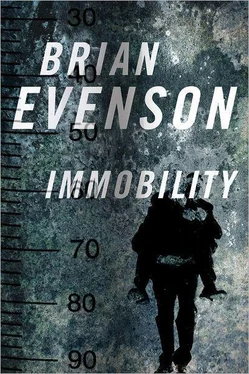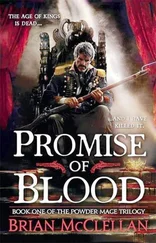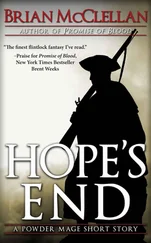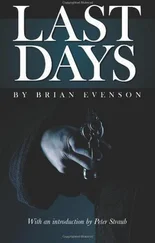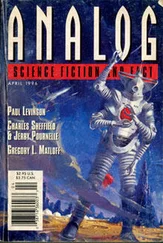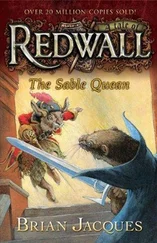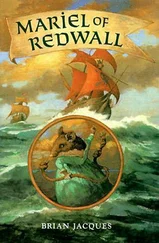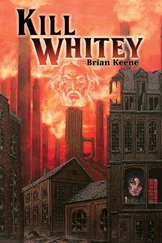“All right,” he said. “We will do as you say.”
* * *
THEY MOVED ON, the two mules relentless, never stopping to rest. They went up a hill and then hit level ground, crossing again through the remains of neighborhoods, another town, perhaps, or maybe the same one, everything seeming at once familiar and utterly foreign.
They passed an anemic stream, its water bloodred. The mules kept as much distance from it as they could. The sun was high overhead now, perhaps just approaching its apex, perhaps just starting its downward arc. He was thirsty, his mouth dry from the dust in the air, his skin grainy with it and raw from the wind. They passed a ruined school, unless it was something else just as large, maybe a hospital. On the other side was another hospital, unless it was a school. The mules stopped and eyed the latter building for a moment, speaking to each other in muffled voices, their speakers half-covered with their gloves, then shook their heads, continued on.
The road began to slope downward. He could see the lake again now, glowering in the distance two or three or more miles away, looking much larger than it had seemed initially at the other end of town, if they were still in the same town. The water was an odd color, a bloodred tinge to it, though not quite as red as the stream had been. A sort of dead marsh lay beside the lake, sickly gray from this distance. Between them and the marsh, he could see a much larger road: the freeway.
Horkai patted Qanik on the head. “There,” he said. “Do you see? That’s the freeway. That’s what we need.”
The mule paused, then nodded. They picked their way toward it, and started north when they finally reached it.
* * *
FOR LONG STRETCHES, the freeway was intact and then would suddenly dissolve into a crater or buckle into peaks so that they had to either go around it or clamber up and down it. It took a long slow curve northeast, following the banks of the lake at a distance, and for an hour or two or maybe three, Horkai thought it was the wrong road. Once or twice he almost said something to the mules, but he didn’t know exactly what to say, nor did he know what other road they could take. The lake had been on the map, so maybe they were on the right road after all. How many freeways could there be?
And then, at last, the road curved north a little and began to climb. He could see, in the distance, the point where it crested the low side of the mountain, miles away. It was okay, he told himself. It was the right road.
BARE LAND ON ONE SIDE, ruins on the other, then ruins on both. It had started to seem all the same to him. “Any chance of a drink?” Horkai asked. “And what about food?”
“Not yet,” said Qatik. “Not here.”
“My tongue feels like it’s made of wool,” he said.
“Your tongue is not made of wool,” reasoned Qanik. “No tongues are made of wool.”
“Soon,” said Qatik. “Soon.”
What soon meant, it was hard to say. They trudged uphill. The sun had slipped lower in the sky. For the first time, Qanik stumbled, almost pitched Horkai off his shoulders. Qatik was immediately there, steadying him. Shall I take him? he was saying. Shall I have my turn? But Qanik, waving him off, kept going.
And then Qatik took off on his own, running hundreds of feet ahead of them, finally vanishing off the side of the road.
“Where’s he gone?” asked Horkai.
“Do not worry,” said Qanik from below him. “He will come back.”
“I’m not worried,” said Horkai. “I just want to know what he’s doing.”
But Qanik kept walking and didn’t respond.
They went a little farther in silence, Qanik grunting occasionally, his steps slightly less steady.
“How many hours have passed?” Horkai finally asked.
“What do you mean, hours?” asked Qanik.
“You don’t know what hours are?”
Qanik didn’t bother to respond.
“How much time has passed since we started?” asked Horkai.
“Most of the day,” said Qanik.
“Can’t you be more specific than that?”
“How?”
He was traveling with a man who seemed not to know what hours were.
He had no watch, no way to measure time, nor had he seen anything like a clock at the community. “When night falls, I can be more specific. Then it will be one day.”
Something had appeared in the road, perhaps a half mile in front of them, perhaps more. It was moving. Horkai’s heart skipped a beat before he realized it must be Qatik.
“Isn’t there anything alive out here?” he asked.
“Roaches,” said Qanik without hesitation. “Sometimes there are roaches, but only sometimes.”
“Anything else?”
Qanik pondered for a long time, his footsteps growing a little less certain. “We are alive and we are out here,” he finally said.
“Other than us,” said Horkai. “Other than the roaches.”
“No,” said Qanik. “Nothing can live here.”
“Then why can I live here? Why don’t I need a suit?”
Horkai felt Qanik’s shoulders twitch, wondered if he had forgotten he was carrying Horkai and had tried to shrug.
“You can survive,” Qanik said. “That is all I know.”
“And how do you know that?”
“Because you are not dead yet.”
Qatik loped up, his black suit now covered with white dust.
“I’ve found a place,” he said. “Just off the road, a facility of some kind. Industrial or farming related. A central building, a series of round cylinders as well, ten in all, on supports, with entrances near the base. Some are still standing.”
“Anyone living in them?” asked Qanik.
“Not that I could see,” said Qatik.
Qanik nodded, gestured the other mule forward with one hand. They followed him up to where the freeway had once crossed over another road—the bridge collapsed now. They clambered down the slope to the roadway below.
What Qatik had called cylinders Horkai recognized as silos. They weren’t far, only a few hundred feet from the freeway. The two or three largest had collapsed, caving in on one another, and were little more than bits and pieces of metal ribs now. But many of the others, smaller and perhaps shielded by the larger ones, were more or less intact.
They went toward them, the two mules pointing and nudging each other. They came close to one, walked around it until Qanik pointed to a huge tear in the metal. They moved on to the next one.
“What are you looking for?” asked Horkai, but neither of them answered.
The roof of the next was gone and they passed it by. The next still was slightly larger and they walked completely around it, squeezing their way through the gap between it and the next one. Finally Qatik turned, eyebrows raised.
“It will do,” Qanik stated.
With Horkai’s help they found the manual hatch release and Qatik tugged on it, but nothing happened. He pulled harder and Horkai heard the metal groan, but it was not until Qanik lumbered forward and grabbed hold as well that the hatch finally sprang open and tens of thousands of husks of long-dead beetles poured out, a fine powdery dust along with it.
When it had stopped, Qatik crunched to the top of the pile and, grabbing the lip of the chute, tried to pull his way in, but the opening was too small. He shucked the two backpacks and this time wriggled in. A moment later, his gloved hand was thrust back out, waited there, palm open.
“Come on,” said Qanik, and reached up to lift Horkai off his shoulders. He hung there helpless in the air, his lifeless legs dangling, like a child’s doll, and then Qanik thrust him up to the chute opening and Qatik’s hand closed around his shirt, dragging him awkwardly in, setting him down roughly on a narrow metal ledge.
Читать дальше
